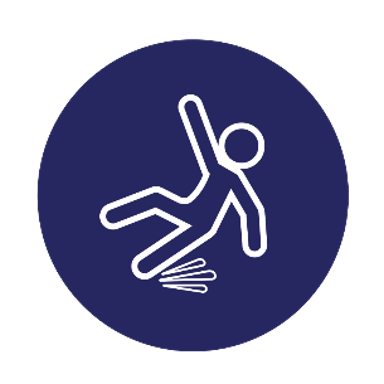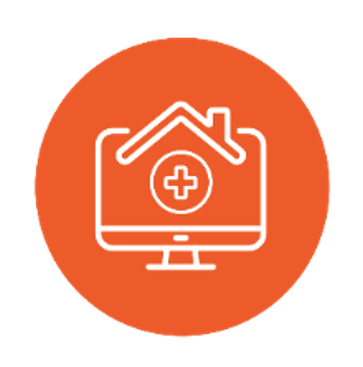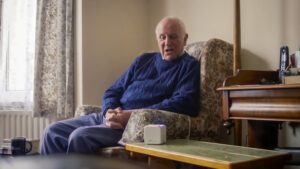The Digitising Social Care programme has funded a number of different projects in the form of time-limited pilots. In-depth reviews of their viability and impact are undertaken at the end of the pilot, and learning goes back to NHS England. This page reflects on the achievements and lessons learned of previous projects.

Acoustic monitoring
343 residents supported across 12 care homes

MiiCare
73 residents supported in their own homes through 73 installations
Preventing falls in care homes
Acoustic Monitoring uses technology to check on residents more often at night without invading their privacy. The system works out whether sounds and movements made by the resident are normal – if not, it raises an alarm to alert the home’s staff. Connected through Wi-Fi, the device can recognise sounds such as the person waking up, crying out, calling for help or being restless.
Staff don’t need to check on people as often, resulting in residents having fewer disturbances and a better night’s sleep. What’s more, the always-on device can alert staff to possible problems at any time, meaning a resident who needs help doesn’t have to wait until the next planned visit and is also less likely to have a fall.
The system, which is used only with the consent of the resident involved, also provides extra reassurance for family members and friends about the safety of their loved one.
We conducted a two-year pilot project to test and evaluate Acoustic Monitoring to build an evidence base for future investment. The aim was to support 502 residents in care settings, and to enhance safety, respond to emergencies more quickly, improve wellbeing by reducing disturbed sleep, and provide efficient nighttime monitoring.
15 care homes participated in the scheme, although three withdrew due to various internal issues unrelated to the technology. As at September 2024, there were 343 kits in use. Analysis of the data demonstrated a positive return on investment for both providers and the BLMK wide Integrated Care System, but the lack of reliable data and uneven participation hindered the evidence of some anticipated benefits. Where care homes were better engaged, the evidence suggests good potential of remote monitoring to reduce hospital admissions, improve quality of life for carers, and improve resident outcomes and quality of care.
All care providers with live contracts funded by BLMK ICP have been advised of their contract end dates and have the opportunity to take up their own contract directly with the supplier going forwards.
What residents and their families say:
“I think the system is good because I know that staff can check on me in the night without waking me up. In the past, when checking on me the light would be turned on. I would struggle to get back to sleep after this, so I think this is much better.” – AC, resident at Burlington Hall Care Home
“Because he was having such horrendous nights and nightmares. The staff would be able to go and comfort him but, if they were busy somewhere, they wouldn’t hear him, perhaps shouting out for them. Since he’s been here, obviously, I’m feeling better in myself and I’m very, very happy with him here. I feel he’s being really looked after.” – JJ, wife of resident at Elcombe House (see video above)
What our care services say:
“Acoustic monitoring has been a great help in ensuring the safety of the residents without disrupting their usual sleeping patterns. It is easy to use and reduces the likelihood of resident falls during the night.”- MK, Night Manager at Burlington Hall Care Home (read Burlington Hall case study)
“Since introducing Ally [acoustic monitoring] just 10 weeks ago, we have not had a single night-time fall. We are very happy to have been introduced to the Ally Care System, it has definitely improved the security of our residents.” – care home manager
“It’s improved the patient experience because the residents used to be awake the whole night, but now they are sleeping really well.” – care assistant
The virtual assistant helping keep people safe and at home for longer

‘Monica’ is a virtual assistant – the voice of a remote monitoring device that checks someone’s wellbeing and daily routines to help them stay safe and well. This is particularly effective for supporting people whose care needs are being assessed after leaving hospital.
In a pilot project, technology company MiiCare partnered with Bedfordshire, Luton and Milton Keynes Integrated Care Board (BLMK ICB) and Luton Borough Council to provide the support for people who are at risk of falls or urinary tract infections. The device was also available for those who had recently left stroke or neurological units. Healthcare professionals involved in a patient’s care could refer them for the service if appropriate.
Monica acts as a health coach, using carefully placed sensors to monitor their movements between rooms or providing reminders to take medication or have a drink. Her prompts and encouragement to look after themselves can help people avoid infections and hospital stays. Door sensors can alert family members and carers when a door is left open, send them SOS messages if help is needed, and provide healthcare professionals with information about someone’s day-to-day life and sleep habits.
The technology not only provides reassurance for the individual and their family members, but also means the person can stay in their own home. That’s better for them, and also reduces the pressure on the care system, enabling services to provide care where it’s most needed.
Press release: How MiiCare is helping people to stay safely in their own homes.
We conducted a pilot project to test and evaluate MiiCare to build an evidence base for future investment. The aim was to support 100 residents in their own home, and to support them to stay at home for longer, reduce avoidable care home admissions, and reduce falls and urinary tract infections.
Since January 2023, we provided 73 kits to homes across Bedfordshire, Luton and Milton Keynes – mostly to people aged 70-89 who had a high risk of falls, early onset dementia or memory loss. Observations included enhanced opportunity for early intervention and support, some individuals were supported to remain at home for longer, and some family members were reassured and felt more in control.
The analysis of the pilot found that the most successful element was having a known or trusted professional to actively monitor and support the individual. However, as is sometimes the case with pilots, there were also factors that meant some of the planned benefits were not fully demonstrated.
The BLMK Digitising Social Care team will continue to work with MiiCare to support individuals with live subscriptions. All existing customers will be notified when their subscription is coming to an end, so they have the option to renew.
What the families say:
“Thanks to the MiiCare app I have assurance at my fingertips! Monica provides me with a real-time picture of where my mother is, and sends me alerts when activity is outside of her normal routines. I am able to easily check her blood pressure (when required by her GP frailty checks), her temperature if she seems unwell, and whether she has taken her tablets. I would undoubtedly recommend MiiCare, as this little box has taken away some of the worry, without removing my mother’s sense of self or independence.” – ‘Karen’ (not her real name), whose mother uses MiiCare. Read Karen’s full story.
What our care providers say:
“Mr D is 86 years young, and lives on his own. He has three daughters who live far away, and a granddaughter who visits once a week. He has a history of falls which led to a hospital admission, and he cannot lift his arms up due to his rotator cuff which cannot be operated on. APT was commissioned to support him four times daily with one carer to help him with personal care, medication, meals and catheter management. MiiCare was discussed soon after discharge with him and the family, and trust established. Mr D and his daughters were worried about him having another fall, lying helpless on the floor until a carer arrived.
“The ability to ask Monica to call in an emergency was described by his granddaughter as ‘a game-changer’. The family can access the dashboard to check in on his wellbeing – how he slept, how active he is… knowing that in the background APT is monitoring as well, and able to respond as appropriate. The family had considered moving Mr D to a residential home, but he didn’t want to leave his home where he’d raised his family. With MiiCare, now he doesn’t have to!” – APT Care Ltd (domiciliary care provider), Luton
You can find out more about what we’re doing by clicking on each of the links below. For more information on the programme, or any of our projects, please email the team.

